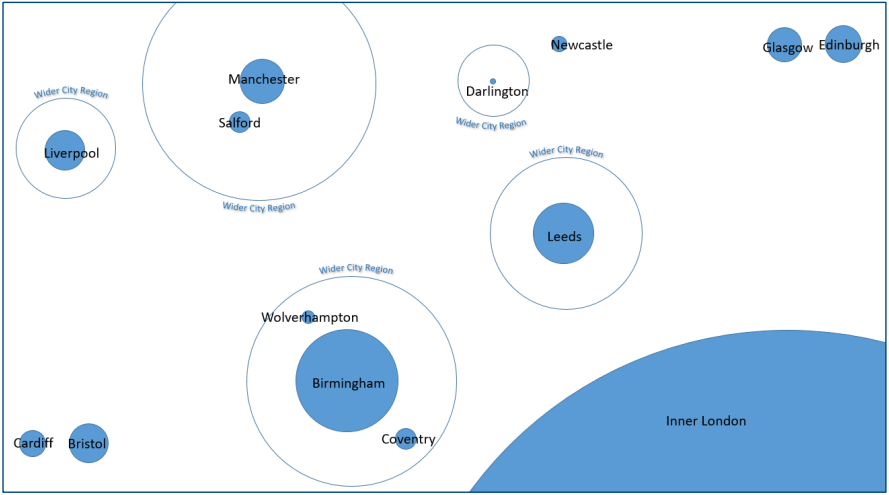Working with industry partners to turn theory, through experimentation, into real-world applications which make life easier, healthier and more sustainable.
UK Quantum Technology Industrial Ecosystem in Quantum Sensors for Gravity and Optical Clocks
Established following a £270m investment from the UK National Quantum Technologies Programme (UKNQTP), The UK Quantum Technology Hub Sensors and Timing, led by the University of Birmingham, has had a major impact on the economy and commerce to date.
Research by the Hub has resulted in enhanced abilities to measure time and gravity with extreme precision using quantum technology (QT), leading to a strategic shift in public spending priorities by the Ministry of Defence and the Defence Science and Technology Laboratory (Dstl).
The Hub has also enabled an ecosystem of over 70 companies to engage in QT research. This reach extends to numerous multi-national companies, informing their commercial strategic decisions, investment priorities and product pipeline. The Hub leads over 110 projects valued at approximately £120m and has 17 patent applications.
UK Quantum Technology Hub Sensors and Timing
Quantum gravity gradient sensor technology explores underground
Transforming policy and practice in the global rail industry
The Birmingham Centre for Railway Research and Education has transformed global railways through contributions to commerce and the economy and through policy and environment. We improved performance and productivity through increased capacity, reliability and efficiency, and informed policy decisions for digitalisation and decarbonisation.
The integration of the Rail Alliance and BCRRE
BCRRE have identified successful ways to help companies innovate and overcome the significant challenges in analysing, modelling and optimising the railway including novel sensing technologies and algorithms for fault detection, diagnosis and prognosis for a range of railway assets.
This research has directly improved rail performance globally, saving more than 1M delay minutes and >£1M/annum through energy optimisation. We have underpinned procurement strategies for digital systems and future traction across the world.
Securing Automotive Immobilisers and Remote Keyless Entry Systems
The sensors and electronic components of modern-day cars manage everything from steering, brakes and navigation to remote control door opening and entertainment. Our cars are increasingly linked to the internet and to each other.
Improving Vehicle Security
Researchers at the University of Birmingham have identified potential security weakness affecting hundreds of millions of vehicles. Working with industry and policymakers we have secured improvements in operational procedures, product redesign and policies connected to vehicle security while raising awareness of vehicle security in the digital age.
Industrial Strategy in the West Midlands and: Changing policy and practice towards growth in professional and business services
In 2017/18, Gross Value Added per head in the West Midlands was £3,545 lower than the UK average. The UK Industrial Strategy and Local Industrial Strategies are crucial vehicles to boost productivity, earnings and inclusive economic growth across the UK.
Researchers from the City Region Economic and Development Institute (City-REDI), through broad and varied research, have shaped the West Midlands Local Industrial Strategy and national policy for economic growth, underpinning national sector support and the Recovery Advice for Business Scheme, as announced by the Treasury in the March 2020 Budget.
City-REDI’s recommendations have ensured that for the first time the professional and business services (PBS) sector has become a sectoral priority and a future market opportunity for regional economic growth. As a result, use of City-REDI’s evidence and recommendations have also led to £2bn of new investment in the region.

Building Economic Resilience: UK regional and national responses to Brexit and Covid-19
Brexit and COVID-19 have highlighted the need for high quality data and analysis to understand the resilience and vulnerability of UK regions to socio-economic shocks. Understanding UK regional inequalities, vulnerabilities and projecting their consequences and necessary mitigating strategies is at the core of the research conducted at the City-Region Economic Development Institute (City-REDI).
City-REDI has improved the West Midlands region’s capacity to withstand the economic threats through shaping the West Midlands region’s socioeconomic policy. The Institute has contributed to the West Midlands Combined Authority’s resilience plan, resulting in concrete interventions, such as the workforce support package, as well as influencing the wider national ‘levelling-up’ agenda.
What are the economic impacts of COVID-19 on the West Midlands?
Through research funding from Research England and local partners, the Institute has been able to work with the West Midlands Combined Authority to establish the West Midlands Regional Economic Development Institute (WM REDI).